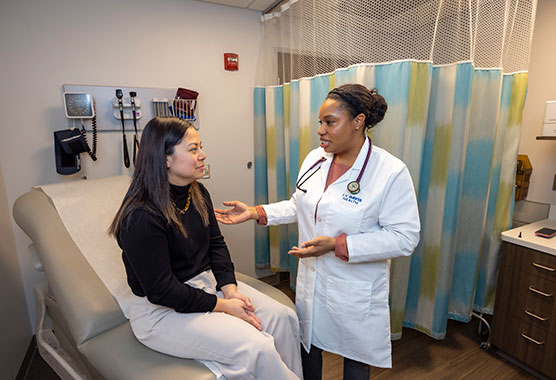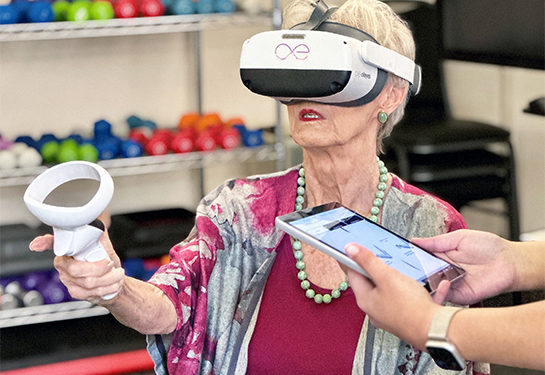Neurology
Our expertise spans the broad range of neurological conditions, including Alzheimer’s disease and other dementias, epilepsy, migraine headaches, stroke, sleep disorders, nerve and muscle disorders, multiple sclerosis, Parkinson’s Disease and other movement disorders.
Medically reviewed by Amy Brooks-Kayal, M.D. on Jan. 04, 2024.

Excellence in Clinical Care and Research
UC Davis Health is among the best hospitals in the U.S. for neurology, according to U.S. News & World Report. We are also a national leader in neurological research.
Through these distinctions in care and research, we are helping drive discoveries about brain health and new treatment approaches for brain disorders. Our experts are here for you and your family with a level of care you won’t find elsewhere in the region.
Our Difference
Experience and Expertise
Our neurologists are highly skilled physicians with training in specific areas of neurology, including pediatric neurology. They partner with specialists across UC Davis Health to provide multidisciplinary care. Families across Northern California seek our help for routine and complex neurological diseases.
Innovative Research
Our researchers are working to better understand the nervous system. They participate in unique research initiatives, such as the Center for Neuroscience, Center for Mind and Brain, Center for Neuroengineering and Medicine, Institute for Pediatric Regenerative Medicine, and UC Davis MIND Institute. Patients can access new treatments through our many clinical trials.
Convenient Care
We provide comprehensive clinical services at UC Davis outpatient facilities in Sacramento. Our providers also offer teleneurology services through partnerships with hospitals and health centers across Northern California. These secure video visits allow you to meet with our experts without leaving your community.
What Is Neurology?
Neurology is the division of medicine that treats conditions of the nervous system. Your nervous system includes your brain, spinal cord, and nerves that carry signals to and from your body. Together, they control your thoughts, behavior, and how your body works.
Neurological diseases and disorders occur when something goes wrong in your nervous system. You may have problems with learning, memory, speech, movement, or other important functions. Researchers have discovered more than 600 different neurological conditions that affect adults and children.
Main Types of Neurological Conditions:
Alzheimer’s Disease and Dementia
Dementia is a general name for a group of diseases that affect your ability to think. These diseases are degenerative, which means they get worse over time. The most common type of dementia is Alzheimer’s disease.
Autoimmune Neurological Diseases
In autoimmune neurological diseases, such as multiple sclerosis and myasthenia gravis, your body attacks your nerve cells. UC Davis Health has one of the largest myasthenia gravis clinics in the U.S.
Cerebrovascular Diseases
Cerebrovascular diseases affect the blood vessels and flow of blood in your brain. Blood vessels can become narrowed or blocked or can burst.
Epilepsy
Epilepsy is a disorder characterized by seizures that may involve part or all of your brain. Some seizures cause confusion or a strange taste or smell. Others lead to a loss of consciousness and muscle spasms.
Headaches and Migraines
Migraine, cluster, and tension headaches can cause severe pain that impacts your daily life. As a leading center for headache medicine, we offer the latest treatments for migraines and access to clinical trials.
Infections
Bacteria and viruses can infect your nervous system. Meningitis is an infection of the tissue surrounding your brain and spinal cord (meninges). Encephalitis is inflammation of the brain that is often the result of a viral infection.
Injuries
Brain and spinal cord injuries are a leading cause of disability, especially in young people. Injuries can range from mild concussions to traumatic brain injuries and paralysis.
Movement Disorders
Movement disorders cause involuntary movements or affect your ability to move. Huntington’s disease and Parkinson’s disease are degenerative movement disorders that destroy brain cells. Other examples include dystonia and essential tremor.
Neuromuscular Disorders
Neuromuscular disorders disrupt communication between your muscles and nerves. As a result, your muscles become weak and break down. Examples include muscular dystrophy and amyotrophic lateral sclerosis (ALS).
Peripheral Nerve Disorders
Peripheral nerves branch off from your spinal cord and brain. Damage to these nerves can cause a wide range of symptoms, depending on the affected nerve. For example, peripheral neuropathy causes tingling, numbness, and pain in your hands and feet.
Sleep Disorders
Sleep disorders interfere with your ability to get a good night’s sleep. There are many types of sleep disorders, including insomnia, sleep apnea, sleep walking and restless leg syndrome.
Leading-Edge Neurologic Diagnostic Testing
Understanding what’s wrong is the first step to getting the care you need. Our neurologists have access to the latest diagnostic tools to make an accurate diagnosis.
Advanced diagnostics include:
Electroencephalography (EEG)
This test measures your brain’s electrical activity. We attach small metal electrodes to your head and record the electrical signals in your brain. Your provider may use an EEG to check for seizures or monitor a brain injury, dementia or other neurological condition.
Electromyography (EMG)
EMG detects problems with your nerves, muscles or nerve-muscle electrical signals. A needle EMG involves inserting a fine needle into a muscle to record electrical activity. A nerve conduction study uses electrode stickers to measure electrical activity between two points.
Neuroimaging
We use neuroimaging tools such as MRI to create pictures of your brain and spinal cord. We use functional MRI to map brain activity. We also offer PET and single photon emission computed tomography (SPECT). These tests use small amounts of radioactive material injected into your vein to detect patterns of brain activity.
Sleep Disorders Testing
We offer sleep studies for adult and pediatric patients. You may have a home sleep study or stay overnight in our sleep laboratory. During an in-lab study, a sleep technologist gently sticks sensors to your body. The sensors measure your breathing, body movements and brain waves throughout the night.
Request an Appointment
As Sacramento's No. 1 hospital, you'll benefit from unique advantages in primary care and specialty care. This includes prevention, diagnosis and treatment options from experts in 150 specialties.
Referring Physicians
To refer a patient, submit an electronic referral form or call.
800-4-UCDAVIS
Patients
Call to make an appointment.
Consumer Resource Center
800-2-UCDAVIS

Ranked among the nation’s best hospitals
A U.S. News & World Report best hospital in cardiology, heart & vascular surgery, diabetes & endocrinology, ENT, geriatrics, neurology & neurosurgery, and pulmonology & lung surgery.

Ranked among the nation’s best children’s hospitals
U.S. News & World Report ranked UC Davis Children’s Hospital among the best in pediatric nephrology, orthopedics*, and pulmonology & lung surgery. (*Together with Shriners Children’s Northern California)

Ranked Sacramento’s #1 hospital
Ranked Sacramento’s #1 hospital by U.S. News, and high-performing in aortic valve surgery, back surgery (spinal fusion), COPD, colon cancer surgery, diabetes, gynecological cancer surgery, heart arrhythmia, heart failure, kidney failure, leukemia, lymphoma & myeloma, lung cancer surgery, pacemaker implantation, pneumonia, prostate cancer surgery, stroke, TAVR, cancer, orthopedics, gastroenterology & GI surgery, and urology.

The nation’s highest nursing honor
UC Davis Medical Center has received Magnet® recognition, the nation’s highest honor for nursing excellence.

World-class cancer care
One of ~59 U.S. cancer centers designated “comprehensive” by the National Cancer Institute.

A leader in health care equality
For the 13th consecutive year, UC Davis Medical Center has been recognized as an LGBTQ+ Healthcare Equality Leader by the educational arm of America’s largest civil rights organization.

